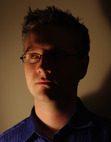Jonathan Ball's Blog, page 64
November 24, 2012
November 2012 Poetry Reviews (Winnipeg Free Press)
My poetry review column is online at the Winnipeg Free Press. This month:
* Undark: An Oratorio (Sandy Pool)
* Trobairitz (Catherine Owen)
* The Archive Carpet (Michael Hetherington)
* Nice Weather (Frederick Seidel)
November 23, 2012
Stewart Cole reviews my three poetry books
Thanks to Stewart Cole for a lengthy and thoughtful review of my three poetry books.
Cole wins a secret award I have been waiting to bestow, by publishing the first negative review of my work. (Starnino just misses because his reservations about Clockfire are mild by comparison to his mostly positive assessment.) Stewart, if you e-mail me your address I will mail your prize.
Cole focuses on The Politics of Knives but also reviews (more positively) my earlier books.
November 15, 2012
8-Ball Interview: Sarah Pinder
1. What do you want to talk about — which question do you wish interviewers would ask, and what is your answer?
How would you describe the relationship between nostalgia and anxiety?
I think nostalgia can sometimes be a coping mechanism for anxiety. I went to see Detropia a few weeks ago – which I didn’t actually think was a good film, but there’s a person interviewed in it who explores abandoned buildings in Detroit that has this beautiful comment about her relationship to the past. She talks about how she imagines a ghost-narrative for her city, from when it was economically booming, superimposed on top of the one that exists now. But at the same time, I think having that nostalgic narrative can generate a certain amount of stress as well as wonder. It can be really overwhelming to be standing in a very quiet, empty place and know it’s thick with dead narratives, and recognize a lot of those narratives, while historic, can’t fit neatly into the parameters of nostalgia.
2. What advice do you wish you’d received, but didn’t, when you first started to take your writing seriously?
Look after your physical health. Your drive and hunger to finish things can help you, but they can also harm you. Really. Take ergonomics seriously, exercise, stretch, take breaks. Sitting down for a long time is actually pretty rough on the body, and I’ve already got wrist, hand and repetitive strain problems at 28. All those things were definitely exacerbated from spending extended hours on the computer, incessantly typing.
3. What is wrong with the publishing industry, and what are they getting right?
I don’t know if the publishing industry has found its equivalent to the crowd-sourced album quite yet… I feel like musicians seem to be using social media to support the physical production of their work more successfully than writers and publishers often are.
4. How will technology change writing?
I’m a bit of a Luddite in some ways – I still don’t have a cell phone, even. The expectation of speed in technologically-mediated writing is difficult for me. Someone tweets me, and I respond a week later, which doesn’t really work.
I think I’m most interested in the ways we use technology to shape the size of the room we think we’re conversing in. I’m still really fascinated by quasi anonymous online spaces like Craigslist or cruising / hookup and dating websites and how people interact with them. What gets said when you feel like you’re in a vacuum?
5. What is your process for a typical piece of writing, from idea to publication? (Give a specific example.)
Archipelagos – the last section in Cutting Room, was written as a long poem project last fall. I set up parameters for myself that I had to write every day for the month of November, all the writing had to belong to one poem, and I had to be more experimental with my line breaks and length than I usually am. I had a document on my computer that I’d come home every night to, open and work on, writing one continuous draft and editing in the document as I went. When that was finished, I edited the whole document, paired it with a photo of my messy bedroom, and put it together as a zine, which I made a small print run of. The zine text was distilled again and edited down with Kevin Connolly before it went into the book – sections were removed and the whole thing was relined significantly.
While I don’t always set up such stringent rules about what I’m doing – the idea of writing as a routine, having some kind of structure or puzzle I want to work out, editing simultaneously while writing, and making a very small print run of the work in zine format before other publications is often the route I go.
6. What are your daily habits as a writer, and as a reader?
I read poetry constantly, but read multiple books in fits and starts, and like having them all around me at the same time. There are four books beside my bed right now, and three open beside my keyboard. It’s difficult for me to leave the house with just one book.
I also carry a notebook with me almost all the time, or just end up with a crumpled pocket full of receipts with notes scrawled on the back of them.
7. What is your ambition as a writer — what do you want to accomplish, personally and professionally?
I want to write more books, but beyond that – I’m most interested in just trying new things. I want to do further film-making, and work on more collaborative projects, particularly if they’re experimenting with structure. I can find group work overwhelming at times – I’m interested in trying to find ways to work collaboratively that also suit or incorporate solitary tendencies. I also want to get better at critical / theoretical writing, and do more teaching.
8. Why don’t you quit?
I’m stubborn, or curious, or both. It depends on the day.


Sarah Pinder was born in Sault Ste Marie. Her poetry has appeared in various literary journals and small magazines, as well as the anthology She’s Shameless. She lives in Toronto.
November 13, 2012
What are you working on, Morroque?
I’m currently at a position where a lot of interesting things recently intersected at completion. One was project involvement with Studio Aduge and their first major release, Qasir al-Wasat: A Night Inbetween. My own role on the project was not very substantial, but it was still interesting to see how a small media project slowly took form over an entire year — what changed, what stayed the same, and why. It was also a wonder to watch Ingrid Skare hold her place as the lead writer, even when English wasn’t her native tongue. It’s great to know that the structure of narrative and story need not be limited to the tradition of one language or another.
Another recent thing happened when The Incongruous Quarterly went live with a video game of my own. Signal Mosaic is a literary game that generates word art and poetry when played. I intended the it as a ludological criticism of a few trends in recent poetry I felt unsatisfied with. (Though, perhaps the method is a bit subtle…) It is also, as a game, probably the only work of its kind to be pushed by a Canadian literary magazine. IQ prides itself on publishing only the most “unpublishable” of poetry or fiction, and Signal Mosaic is most certainly that. Yet, even for the adventurous, there were still many delays between the final product and installation-turn-publication, as they slowly learned what the Internet looks like outside of the comfortable confines of a WordPress.
Signal Mosaic is notable for me as my first game that wasn’t based to an engine and written entirely from scratch using HTML5 and Javascript. Using a canvas context, it’s quite easy to make a pseudo-OpenGL animation loop. It wasn’t that long ago Javascript was a simple and uncomplicated little scriptor only used to add unnecessary flourish to web design – described by other programmers I knew not just as a ‘joke’, but ‘an entire comedy routine’. (This fervour is usually reserved for PHP, nowadays.) However, more functions in HTML5 improved Javascript’s usefulness extensively. The winds tell me that, soon, full applications in HTML5/Javascript can be made for Windows 8 computers, though I’m unsure how powerful they’ll be.
But I still wonder how long it will last… Computing is an evanescent media. My last attempted game failed tragically when it was so close to a gold candidate with working netplay and everything. It was developed on the 32-bit Windows XP, but couldn’t make the jump over to the 64-bit Windows 7 without all the graphics melting. The world decided to pull the rug out from under it. That’s why, even with all the excitement of video gaming to reach new audiences, I’m still pulled towards writing traditionally. The work there has a much smoother relationship with time.
With these things finished, I’m again getting my bearings to begin new projects. The “big” things that claimed my attention include one novelette and one video game. While not directly related, the two of them share similar themes. The novelette approaches the subject from a semi-serious and mostly realistic vantage, while the game approaches it as a comedy and exaggerates everything to impossible extremes. I’m actually a bit worried about the novelette. I can cover all the needed ground in only a few short chapters, but it is too much for a short story and requires a lot of padding to upgrade to a novel or novella. As such, finding publication for it somewhere will be difficult due to standard size constraints.
Yet even then, the novelette holds that possibility above the game, which is almost a fruitless venture entirely. It will need to be released as freeware due to asset limitations, the team choice in engine with editor, and also the numerous possible violations of the EULA we did in order hack in added functionality. Strange as this sounds, I find this remarkably freeing. We’re under no pressure, so we can test out any number of ridiculous ideas. With trigonometry, the right parabola and a very selective regard for physics, we can fire a person from a cannon, only to have them land in the barrel of another cannon to fire them back. We’re doing it for the science! That’s what counts, ar?
Morroque (Short: MW) is a computer programmer and training media producer from a nondescript location in rural Canada, currently working as an iOS developer. He is the webmaster of the Rêvasser Network.
November 12, 2012
Review: Lazy Bastardism by Carmine Starnino
My review of Carmine Starnino’s latest essay collection is online at The Winnipeg Review.
November 11, 2012
Top 5 ‘Artworks’ of 2010
Published in UPTOWN in January 2011, as my “2010 year-in-review” for the art world
As we look back at 2010, it’s important to celebrate humanity’s greatest artistic achievements. Although innumerable artworks were worthy of notice, five towered over all others. Drawing across many fields of art, here are the greatest artworks of the past year.
5. Arnold Schwarzenegger Continues and Concludes His Governorship
Although his term has not begun, with the election of Edmund Gerald (Jerry) Brown, Jr., the governorship of Arnold Schwarzenegger more or less drew to a close in 2010. Without a doubt it was one of acting’s finest performances — so convincing that the utterly unqualified Schwarzenegger was actually given the reins of one of the world’s largest economies from Nov. 2003 to Jan. 2011, not to mention control of various state programs.
Those who know Schwarzenegger’s acting only from movies such as Red Sonja and Junior were surprised by the vigour with which he began his political acting career. But the seeds were always there. In Batman & Robin, he uttered that immortal line: “In this universe, there’s only one absolute: everything freezes!” It sounded like total gibberish, but now we can look back and see that he was practicing, even then, for a career as one of America’s most powerful political figures. (Look, if you don’t see the connection, I don’t know what to say — you just don’t appreciate art.)
4. Lil Wayne Covers His Genitals in Diamonds
After the success of Damien Hirst’s For the Love of God, a human skull recreated in platinum and encrusted with thousands of diamonds, rapper Lil Wayne announced he was “getting out of the rap game” and “getting into the art world in a big way” by encrusting his own genitals with diamonds. The resulting artwork is fascinating, though no longer functional — the ultimate ‘bling’ and a stunning testament to the generative potential and primal power of art.
3. Kenneth Goldsmith Crafts History’s Worst Novel
Kenneth Goldsmith rose to literary prominence by pioneering his own brand of “uncreative writing” — books such as Day, in which he recopied all of the text from one day’s edition of the New York Times. But in 2010, Goldsmith produced what may be his magnum opus — history’s worst novel.
Another work of conceptual literature, Goldsmith’s novel And Then I Ate the Wombat (A Reminder of Our Mortality Being Only One of Many Universal Themes) is composed entirely of the worst lines copied from other novels, taken throughout history, in English or in translation. From page 1 to page 15,907, the brilliance of these decidedly un-brilliant lines captivates. My personal favourite (for its subtlety) is a line from page 13,485, taken from the Dean Koontz novel Relentless: “The scenery is stunning where we live now, but I will not describe it.”
2. Xie’s Performance Art Masterpiece: Nothing At All
In 2010, one performance artist stood apart from the rest, in both ambition and execution: Zhong Xie. Xie exploded the preconceptions of the art world with an extended performance piece, in which he did absolutely nothing of note during the whole of 2010.
Nothing can ever be the same in the performance art world after this piece. The most brilliant part of Xie’s performance may be his public demeanour — anytime he was asked about his project and the ideas behind it, Xie maintained that he was “not a performance artist” and had “no idea what anybody is talking about,” and that he only wished “you artsy types would leave me alone.”
1. The Planned Destruction of the Sun
There’s ambition, and there’s Ambition — Dr. Vladimir Draxas is guilty of the latter, capital-A Ambition, just as he is guilty of the most heinous, supervillainesque crime against humanity: threatening to destroy the sun itself.
Moreover, in preparing his doomsday weapon, and threatening to discharge it and thus end all life on this world, while dismantling the solar system, Draxas has not descended into comic-book villainy. No. He has issued an ingenious demand: that we take him seriously, and quit pretending that the doomsday weapon doesn’t work and this is just an artistic performance.
Thus, Draxas’s work calls many binaries into question, including the limits and stakes of artistic performance and achievement itself. The doomsday weapon itself is a masterpiece of post-post-post-modern sculpture, as anyone who has seen it floating near the moon can attest.
One must assume this is only the first of many demands but, because Draxas won’t stop whining, it is hard to tell. Expect this performance to blossom in the new year!
November 10, 2012
What are you working on right now, Carrie Snyder?
The past two months have been subsumed by festivals, workshops, travel, interviews, visiting book clubs, and anything and everything that has cropped up and is related to publicity efforts on behalf of my second book, The Juliet Stories. I’ve been quite unable to settle and give myself over to the project I was working on during the summer. But I knew in advance that it would be a busy time, as fall always is for our family, and I was prepared to burn my creative energies in other, smaller ways.
I write regular blog posts as Obscure CanLit Mama. It’s been particularly enjoyable this fall to recount my travels and experiences touring the book.
I am currently working on two essays for separate anthologies. One is at the editing stage, and is titled “Delivery,” and will be published next fall in an anthology titled How to expect what you’re not expecting, which deals with childbirth, loss, and grief. The other is an essay on food, for an anthology that has a working title that goes roughly like this: Mennonite Girls Can Write (about food). I was approached by the editors to contribute something, and it’s in progress.
All of the above fall into the category of creative non-fiction, which is strange for a writer of fiction to admit, but seems to be a direction I’m being pulled in, perhaps because of the blog. I began blogging about my daily life more than four years ago, and have become very comfortable with that voice, and with transposing real events into words and stories.
But I am also at work on a novel, and I look forward to burying myself in it as winter approaches. I am too superstitious to reveal much about it. My inspiration comes from disparate sources, including old photographs, feminism, and my own experience discovering my inner athlete at the age of 35. I’m eager to discover how all the pieces fit together. I’ll give you the working title: The Girl Runner.
November 8, 2012
Nov. 25 | Jonathan Ball joins Spencer Gordon at the Winnipeg Launch of Cosmo
Winnipeg Launch of Cosmo
with readings by Spencer Gordon, Jonathan Ball and Chandra Mayor
Sunday, November 25, 2012
McNally Robinson Grant Park in the Atrium, 1120 Grant Avenue
Winnipeg, MB
2 p.m.
Free event
Coach House Books and McNally Robinson are pleased to present the Winnipeg launch of Spencer Gordon‘s Cosmo on Sunday, November 25. Gordon will be at McNally Robinson Grant Park in the Atrium to read from his debut collection of short fiction that mines pop culture and the surreal world of celebrity for its tales of existential inquiry. Cosmo is perhaps best described as “Camus meets Chamillionaire.”
An admirer of Miley Cyrus performs a three-thousand word sentence in defence of his passion. Actor Matthew McConaughey descends into a surreal, stupefying desert of the soul. An aging porn star dons a grotesque dinosaur costume to film the sex scene of his life. Such are the speakers and stars of a collection of stories that explode the conventions of short fiction. Though shifting wildly in tone, structure and perspective from one page to the next, each of these mercurial stories is drenched in pop culture, the distancing effects of modern communication and the malaise of solitary existence. At their core, these stories are a portrait of ordinary people (as well as celebrities – they’re just like us!) striving, thinking and suffering alone.
This free afternoon event will also feature readings by Jonathan Ball (The Politics of Knives, also released by Coach House Books this fall) and Chandra Mayor.
ABOUT THE AUTHOR: Originally from Thompson, Manitoba, Spencer Gordon holds an MA from the University of Toronto. He is co-editor of the online literary journal The Puritan and the Toronto-based micro-press Ferno House. His own stories, articles and poems have been published in numerous periodicals and anthologies. He blogs at dangerousliterature.blogspot.com and teaches writing at Humber College.
PRAISE FOR COSMO: ‘…Spencer Gordon [is] one of the most daring writers I’ve ever come across. These stories read like collaborations between Stephen King and TMZ with Borges and Nabokov on the edits. Each short story sounds with the thunder of a novel. Enthralling, dark, gut-busting stuff!’ – Jeff Parker, author of Ovenman and Igor in Crisis: A Russian Journal
What are you working on right now, Angie Abdou?
I’m in the process of doing a final (I hope!) rewrite of a new novel about foreign nannies and hot yoga. I have to be careful when I give that quick summary because I often catch myself saying that it’s about “foreign yoga and HOT NANNIES.” That seems to get a better reaction, actually. Recently, a friend asked me to elaborate. I said “It’s about motherhood and insanity, about domestic help, about first world entitlement, about liberal guilt, about sex and sexuality, about class, about privilege, about beauty, about aging, about scripted identity, about excess, about …” Eventually, I stopped. There was a moment of silence. I added, “It’s more ambitious and sprawling than my previous books. It’s set in Canada, Hong Kong, Philipinnes, Jamaica, and Mexico.” Finally, he spoke: “You haven’t told me one thing about what happens and who is in the damn thing.” True. Maybe that’s because I’m an English teacher and I tend to think of a book more in terms of its ideas or thematic preoccupations rather than its plot. Maybe, it’s because I want you to read the book to find out those details. I hope you’ll be able to do that soon.
For fun – a spoof trailer for The Canterbury Trail (“The Bitch Stole My Life, Part II”).


Angie Abdou has a Ph.D. from University of Calgary and three published books. Her first novel, The Bone Cage, was a Canada Reads finalist in 2011 and the 2012 MacEwan Book of the Year. Her more recent novel, The Canterbury Trail, was a finalist for the 2011 Banff Mountain Book of the Year and won a 2012 IPPY, gold medal for Canada West. It’s a dark comedy about mountain culture. Angie lives in Fernie, BC with her husband and two small children. She teaches full-time at the College of the Rockies.
November 6, 2012
What are you working on right now, Dora Dueck?
I’ve been busy with a whole host of things “around” writing, like launches and readings, but right now, I’m back. Back at my desk, that is, working on a novel – my third. This Monday morning when I woke, my first thought was I’m back at it, and I have to say, I felt ecstatic.
I got a Manitoba Arts Council grant for the project late last year, which was wonderful, not just for the financial support, but for the focus and accountability it provided. I did what I promised; I revised a rough first draft into a near-final draft. But near-final isn’t yet the same as final, so working towards Final is what I’m doing now. I’m enjoying it, yes, but also impatient to be finished, since a couple of non-fiction ideas are begging for attention too.
As for what the novel is about, here’s the sentence I gave the people at MAC, which is still more or less accurate: “a novel in which an archivist investigates the mysterious life and death of her odd uncle.” I’m squeezing all the time I can find into revisions from now until mid-December or so and will try not to let myself fret, until I absolutely have to, about the where, when, and how of publishing the book in today’s publishing environment!
I also write an occasional post at my blog, “Borrowing Bones.”
Dora Dueck recently launched a collection of short fiction, What You Get at Home (Turnstone Press). Her novel, This Hidden Thing (CMU, 2010), won the McNally Robinson Book of the Year Award and was shortlisted for the Margaret Laurence Award for Fiction at the 2011 Manitoba Book Awards.



